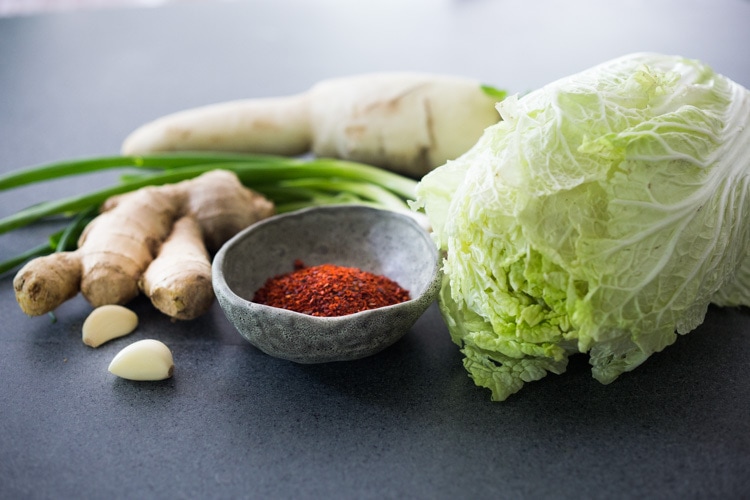The Health Benefits of Kimchi
When humans follow nature’s way of doing things, unexpected benefits pop up. Just ask the people of Korea, who for centuries have been preserving their vegetables via wild fermentation to make kimchi, their national -- and totally natural -- dish. In return for preserving this revered condiment naturally, nature lavishes benefits on anyone who imbibes. The benefits of kimchi are so lavish, in fact, that it can be considered a perfect food. At least, to us. One chief reason this delicious condiment has been a staple in the Korean diet for centuries, and more recently a favorite around the world, is that it tastes great!
The Many Benefits of Kimchi
The ingredients in Tongbaechu kimchi -- the modern Korean style -- are nutritional superstars. They include Asian chives, carrots, garlic, ginger, green onion, red pepper flakes, Korean radish, napa cabbage, onions, rice flour, Chinese celery, fish sauce, salt, and sugar. In wildbrine’s recipe, there are also sea vegetables and sesame seeds, but no animal products at all – we scrap the fish sauce altogether -- and no sugar whatsoever. We don't add sugar to our products, ever. Fermentation enhances the flavors and adds a unique taste that’s part umami and part Korean.
Kimchi is low in calories (a 100-gram serving has only 30 calories) and fat, but rich in vitamins. It’s packed with vitamin C, beta-carotene, minerals, fiber, and a wide array of health-giving substances in its leafy greens. It’s also alive with healthful acid-loving bacteria that suppress microorganisms that cause decay and disease. The leuconostoc bacteria in kimchi produce dextrin, which helps stop the growth of Helicobacter pylori, a microbe that causes peptic ulcer in the stomach. The good bacteria not only keep this superfood safe to eat, they seed the human gut with probiotic bacteria that contribute mightily to our body’s digestive power, strong immune function, and overall physical and mental well-being.

There are also the unexpected benefits of kimchi. First, it can help control weight. The strains of bacteria in this food suppress the appetite and lower blood sugar. The fiber makes one feel full faster and for longer periods. The spicy red pepper’s capsaicin also contributes to that satisfying sense of fullness.
- Kimchi helps regulate blood cholesterol. Researchers at Pusan National University in South Korea found that it lowers LDL cholesterol (the bad kind) and total cholesterol. Garlic in the recipe contains allicin and selenium, both of which reduce cholesterol and subsequent plaque build-up in arterial walls. This reduces the risk of stroke and heart disease.
- Antioxidants and vitamin C in kimchi reduce the inflammation that lies at the root of many diseases. Studies have also shown anti-aging effects on the body’s cells.
- By supporting a healthy gut microbiome, the probiotic bacteria in kimchi boost the immune system. Besides being probiotic, the ingredients themselves have a range of flavonoids and phenolic compounds that strengthen the immune system. Red pepper, garlic, and ginger all show such a positive effect.
- It’s well known that cabbage family members—including the Napa cabbage that figures so centrally in its culinary DNA —help fight cancer. Studies have found that the sulfur-containing compounds called glucosinolates found in cabbage family vegetables inhibit cancer cell growth.
- Three ounces of kimchi—one serving—contain about 20 percent of the daily need for vitamin A, a crucial nutrient for the development of a healthy body in the womb and later in life.
- The selenium in garlic also keeps your skin and hair healthy, and it helps the body produce glutathione, a booster that reconstitutes vitamin C and preserves it, making it more effective.
- Chinese cabbage and radishes in the recipe contain biologically active chemicals that help detoxify and eliminate heavy metals in the liver, small intestine, and kidneys.
These are just some of the many benefits of kimchi. It’s so beloved by Koreans that when having their photo taken, they don’t say, “Cheese,” they say “Kimchi!”
For more on this dish of preserved fermented vegetables, visit our post on What is Kimchi?
About the Author: Sonoma County resident Jeff Cox is the author of 24 books, including including The Essential Book of Fermentation (Avery, 2013)